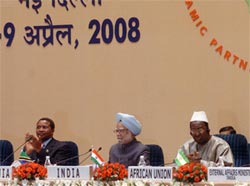|
 The two-day India-Africa summit concluded in the capital today with the adoption of the Delhi Declaration and the Africa-India Framework for Cooperation that constitute a blueprint for cooperation between the two sides in the 21st century, in the areas of energy, terrorism, climate change and UN Reforms. The two-day India-Africa summit concluded in the capital today with the adoption of the Delhi Declaration and the Africa-India Framework for Cooperation that constitute a blueprint for cooperation between the two sides in the 21st century, in the areas of energy, terrorism, climate change and UN Reforms.
The first summit between India and the member states of the African Union and the Regional Economic Communities of Africa focussed on ways to boost relations between the two sides, with particular emphasis on economy, trade, agriculture and human resources. In his concluding address, prime minister Dr Manmohan Singh said the summit has given a new impetus to India- Africa relations. Prime Minister Dr Manmohan Singh had yesterday announced a unilateral duty-free market access scheme for the 50 least developed countries (See: Preferential market access for African exports, PM tells India-Africa Summit in New Delhi) 34 of which are in mineral and oil-rich Africa where India is keen to expand its influence. The duty free tariff preference scheme specifically provides preferential market access on tariff lines that comprise 92.5 per cent of global exports from these countries, including cocoa, aluminium ores, copper ores, cashew nets, cane sugar, ready made garments, fish fillets and non-industrial diamonds. Dr Singh said the initiative was being announced as India recognised the crucial importance of market access in ensuring the development dimension of international trade, a gesture that was strongly appreciated by the assembled heads of states and governments of the African states said this would boost the much-desired engagement between the African countries and India. At a joint press meting at the concluding session of the summit in New Delhi today Dr Singh said Indias enhancement of its budget for technical assistance and training programmes and, greater opportunities for African students to pursue studies in India reflected the priority it attached to human resource development and capacity building. The prime minister also offered the African states Indian assistance in ushering in a green revolution in Africa through holistic capacity building in agricultural production, storage and transportation. Dr Singh said India's pan-African e-network project ''is an example of our cooperation at the continent wide level''. He said, India has laid firm foundations on which to build the new framework of cooperation and it is now time to plan ahead to implement the joint programmes of cooperation and to build a meaningful and productive Indo-African partnership. ''India looks forward to doing so with all the resources at our disposal''. The friendship and empathy that Africa has always shown to India, was an asset to India's foreign policy., he said "India wishes to see the 21st century as the century of Asia and Africa, with the people of the two continents working together to promote inclusive globalisation," he told the assembled leaders. .
"Events in India and Africa in the middle of 20th century changed the world. Today, we have a second chance to take charge of our own destiny and give a new meaning to the concept of sustainable, equitable and environment-friendly development," he said. See: Text of Dr Singh's statement during joint media interaction at the conclusion of the First India-Africa Summit
|